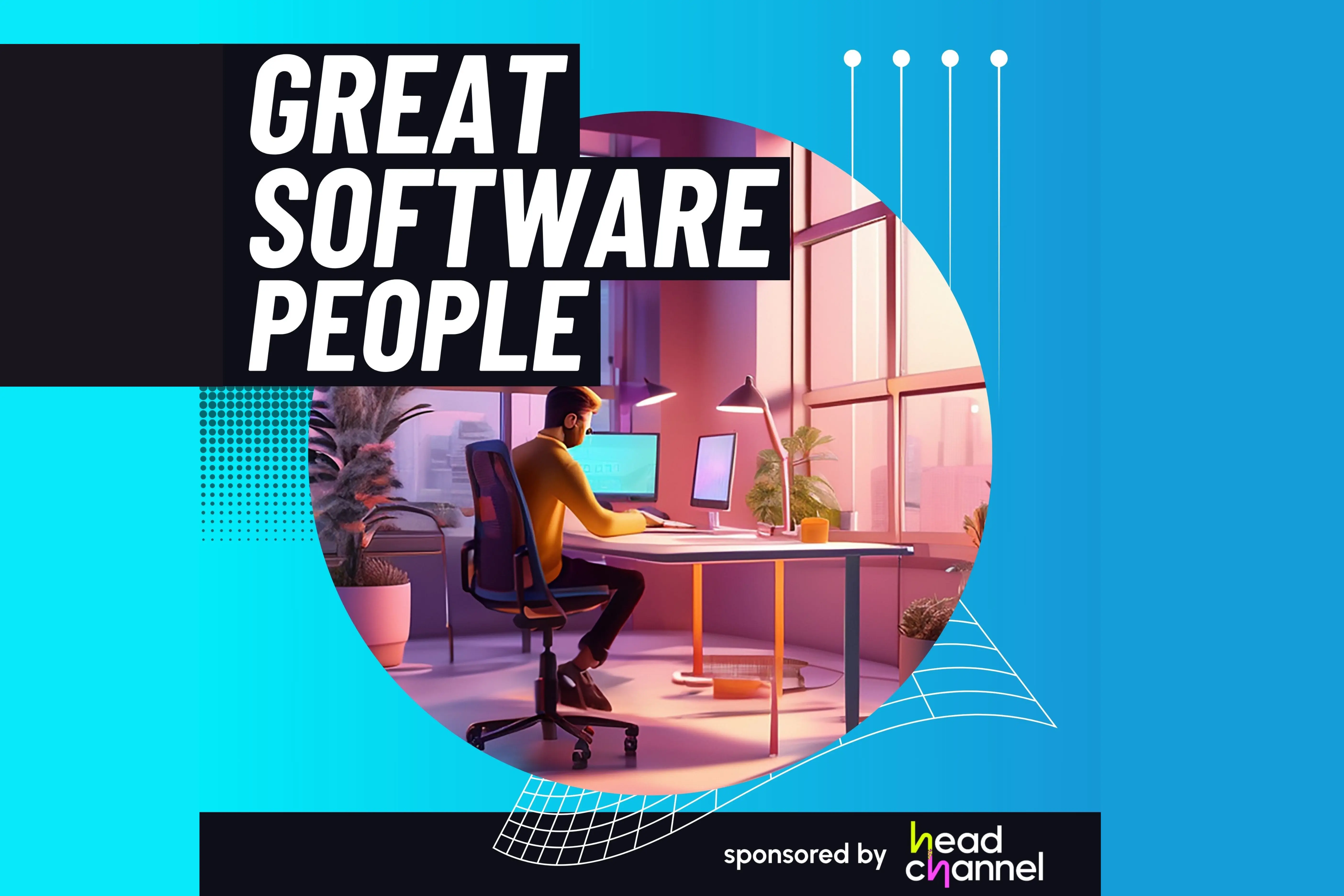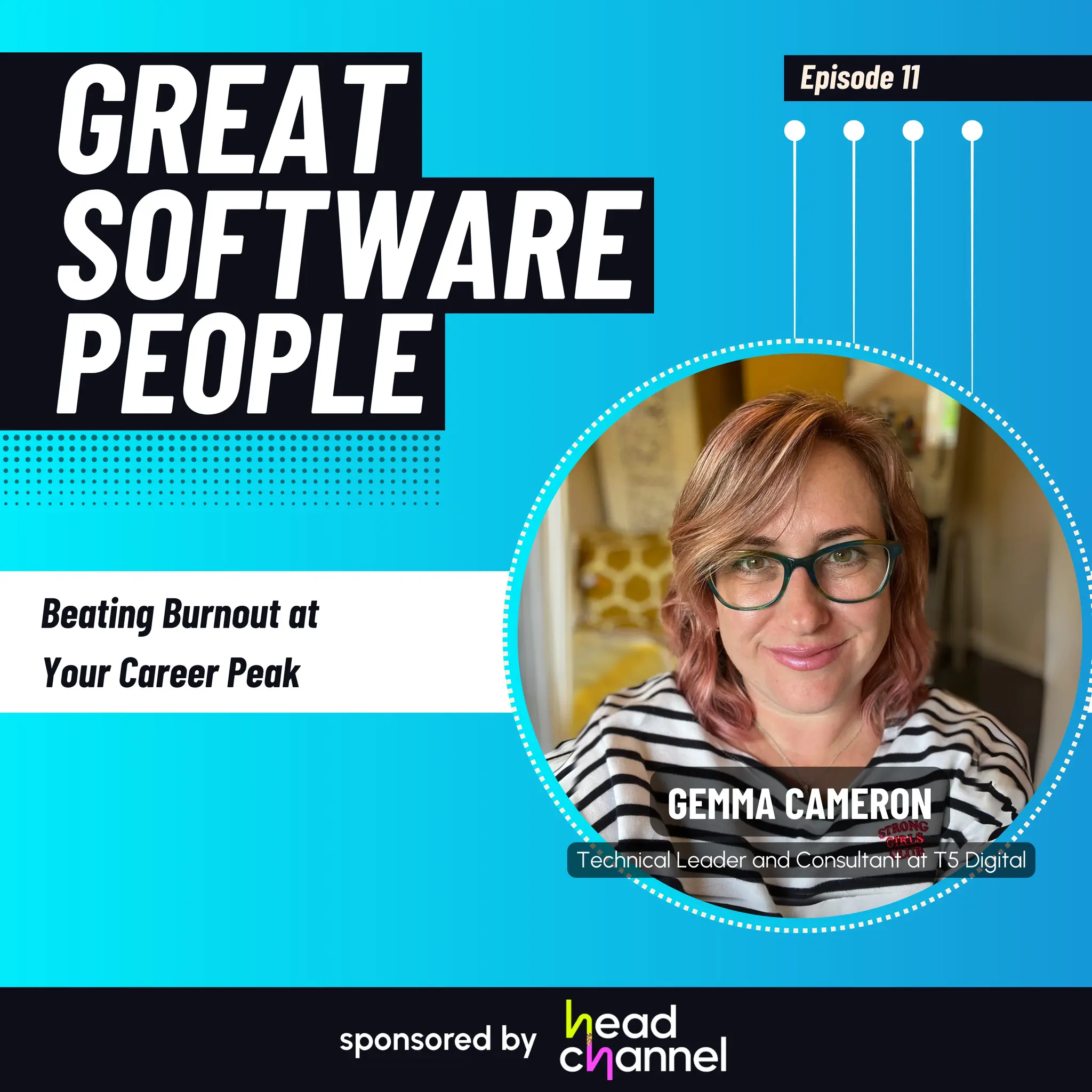
Beating Burnout at Your Career Peak with Technical Leader and Consultant at T5 Digital, Gemma Cameron - E11
With career highlights spanning Co-op, LateRooms and the Eurofighter Typhoon it’s clear to see that Gemma Cameron’s carved an impressive career for herself.
Of all the qualities that she exhibits, however, its being attuned to her wellbeing that’s become paramount as her technical leadership journey has evolved into her role at T5 Digital.
Join us for a fascinating foray through her career, the surprising role of comic strips in achieving buy-in to an idea, and how to spot signs of burnout.
This episode covers:
-
Early work on engineering support systems for the Eurofighter Typhoon
-
Gemma’s incredible work achieving gender parity in her role at Co-op
-
Differing experiences between greenfield startups and established businesses
-
Gemma’s experience with burnout in March 2020, the early signs, and what’s aided in her recovery

Episode highlights
“I was working on the Eurofighter Typhoon project, on the engineering support system.” - 12:40 - Gemma Cameron
“The internet is built on people going to a network event, meeting up, and saying ‘We should connect our networks’. We used comic strips to show how it could be done better.” - 27:20 - Gemma Cameron
“These hackathons were amazing - we had some 16 year olds creating facial recognition technology from scratch.” - 42:50 - Gemma Cameron
“We’ve been doing quite a good job of getting people in and building quite diverse teams at that point as well. We had gender parity, which I thought was pretty impressive.” - 59:05 - Gemma Cameron
“It took me four years to recover from burnout. Starting something new and talking about experiences has helped to pull myself out of that negative headspace.” - 1:13:00 - Gemma Cameron
LISTEN HERE:
[00:00:13]
Rich: Welcome to another episode of Great Software People! Today, I’m excited to be joined by Gemma Cameron, a consultant and technical leader at T5 Digital. Hi, Gemma!
Gemma: Hi Rich, thanks for having me!
Rich: Today, we’ll explore Gemma’s fascinating career journey, discuss mental health in tech, and highlight lessons on avoiding and recovering from burnout. Lots to cover!
[00:00:47]
Rich: Let’s start with your early days. Growing up, what did you want to do?
Gemma: I was lucky to have early exposure to tech. My dad, an electrical engineer, brought a laptop home in the mid-80s, and I was fascinated. I remember making invites on a dot matrix printer. He and my mum, who was a dinner lady, encouraged me to pursue what I loved. At 14, a school trip to Lancaster University’s physics department introduced me to computer science. They had a chamber that replicated near-absolute zero. That trip solidified my path. I decided then to study computer science, which helped me line up my GCSEs and A-levels toward that goal.
[00:03:11]
Rich: That’s impressive—deciding so early! Did you feel that tech was accessible for other young people at the time?
Gemma: Not really. Many kids didn’t see careers in tech, engineering, or science because they lacked role models. I’ve since worked with schools to show kids these opportunities. It’s shocking how many think their only options are childcare or construction because that’s all they’ve seen.
[00:03:57]
Rich: You pursued computer science at university. How was that experience?
Gemma: I went to Salford University because they offered a year in industry, which appealed to me. My A-levels were in Maths, Physics, and English, so I wasn’t overly focused on computing theory, but the practical applications made the course valuable. The year in industry was at Lex Vehicle Leasing. It wasn’t ground-breaking work—I walked around getting release notes signed! But it gave me exposure to how tech teams operate.
[00:06:09]
Rich: What came next?
Gemma: After graduating, I joined Aerosystems International (later acquired by BAE Systems) as a manual tester. It was an eye-opening experience working on projects like command-and-control systems for aircraft and mission control systems for Apache helicopters. I learned Java, explored Agile practices, and started integrating automation into workflows. I eventually moved to BAE’s Wharton site to work on the Eurofighter Typhoon project, using VB6 and introducing OO concepts. It wasn’t the most modern tech stack, but I learned a lot about engineering processes.
[00:14:00]
Rich: Around this time, you started engaging with tech communities. How did that shape your career?
Gemma: I began attending events like GeekUp Manchester and later organised my own, like BarCamp Blackpool and Girl Geek Dinners. These communities introduced me to new ideas and people, helping me grow professionally and personally. Through Twitter, I landed a role at a modern tech company in Nottingham called Sendex. It allowed me to work with cutting-edge tools like .NET, AWS, and CQRS, which were miles ahead of what I was doing at BAE.
[00:19:42]
Rich: From Nottingham, you moved back to Manchester for LateRooms. What stood out there?
Gemma: LateRooms was a great learning experience. It had a massive monolith codebase, and the release process was a nightmare—it took weeks. We worked on automating deployments and breaking the monolith into manageable pieces. By the time I left, releases took just 45 minutes.
[00:24:00]
Rich: After LateRooms, you joined a startup, Allegro Networks. How was that?
Gemma: It was amazing! Allegro was the first company in the world to automate network provisioning between data centres. I joined as part of a small team, and we delivered a launch product in three months. To communicate complex ideas, I started creating user stories as comics. It was a fun and effective way to engage stakeholders.
[00:31:20]
Rich: What happened after Allegro?
Gemma: Allegro was acquired by a Silicon Valley company, but the culture shift wasn’t for me. I left to do some contracting, working on projects like BrightHR and Lancaster University. Eventually, I joined Co-op Digital.
[00:45:00]
Rich: Co-op Digital seems like a pivotal part of your career. Tell us about it.
Gemma: I joined as a Principal Software Engineer and stayed for seven years. Co-op Digital brought in the Government Digital Service (GDS) team to modernise operations. We focused on user-centric design, with discovery, alpha, beta, and live phases for projects. One standout was streamlining funeral care processes, where we worked closely with funeral directors to develop tools that genuinely helped them.
[00:58:00]
Rich: You mentioned experiencing burnout while at Co-op. How did that manifest, and what helped you recover?
Gemma: Burnout felt like my battery was completely drained. I couldn’t focus or enjoy anything. Work consumed my thoughts, and I felt like I was failing at everything. Recovery started with counselling and learning to recharge. Nature walks, time with pets, and setting healthy work boundaries were key. It took me four years to fully recover, but I’ve learned to prioritise balance.
[01:10:00]
Rich: You’re now at T5 Digital. How’s that going?
Gemma: It’s been fantastic. Consulting allows me to share my experiences and help organisations improve. Reflecting on my achievements—like automating LateRooms’ release process—has been therapeutic.
[01:11:22]
Rich: Gemma, you’ve had an incredible journey. Thanks for sharing your insights, especially on burnout and building tech communities.
Gemma: Thank you, Rich. It’s been a pleasure to reflect on my career and hopefully help others spot burnout early.
Rich: Absolutely. Thanks again, Gemma!

Contact us.
If you need a partner in software development, we're here to help you.
We will respond to your enquiry immediately.